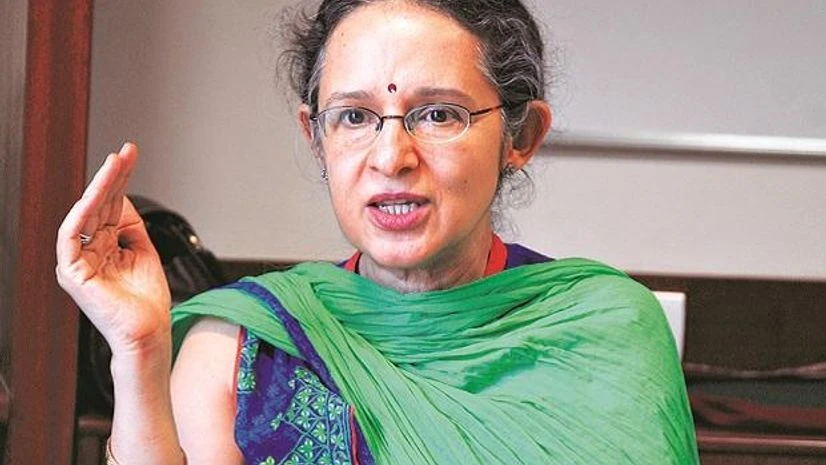Notwithstanding the pandemic severe shock, India's macroeconomy is more healthy and ready for faster growth, eminent economist Ashima Goyal said on Sunday, observing that recovery from both the first and second waves was faster than expected points towards inherent strengths of the economy.
Goyal in an interview to PTI said there are already signs of a rise in private investment in sectors where capacity constraints have appeared.
"Despite the Covid-19 severe shock, India's macroeconomy is more healthy and ready for faster growth than it has been for a long time. That recovery from both the first and second waves was faster than expected points towards inherent strengths of the economy," she said.
The Reserve Bank of India (RBI) has lowered the country's growth projection for the current financial year to 9.5 per cent from 10.5 per cent estimated earlier, while the World Bank has projected India's economy to grow at 8.3 per cent in 2021.
Goyal, who is also a member of the Monetary Policy Committee (MPC) of the Reserve Bank, said that although many Indian start-ups are doing well but "we should not, however, expect the private infrastructure investment boom of the 2000s."
"Portfolio inflows into India are not only due to the quantitative easing of rich countries' central banks, they are also attracted by India's growth prospects. All emerging markets do not get such inflows," the eminent economist opined.
Also Read
She pointed out that the government is leading infrastructure investment and more durable foreign direct investment has a larger share in recent capital inflows.
"India, moreover, has enough reserves to ride out any volatility while ensuring interest rates are aligned to the domestic policy cycle," she said.
On the stock market boom at a time when economic growth has slowed down, Goyal said stock markets are forward looking, so normally they do move ahead of the real economy.
"Low interest rates also increase the present discounted value of future earnings and reduce the attractiveness of fixed deposits. A wider Indian public has started participating in stock markets giving them a more diversified portfolio of assets," she said.
Observing that having different investor-types makes markets more stable and reduces volatility, Goyal said "gradual rise in policy interest rates need not lead to a major correction if the rise accompanies a growth recovery, which is positive for markets and long term growth prospects remain good."
On recent calls for using the huge forex reserves for infrastructure development or recapitalisation of public sector banks, the economist said Indian forex reserves are not earned by an excess of exports over imports.
"They are borrowed reserves built up from foreign inflows that create liabilities. Reserves have to be kept in a liquid form and capital-value preserved to meet repayment obligations," she said, adding they give security but are costly.
According to Goyal, the best way to prevent excessive reserve accumulation is to increase absorption of foreign inflows in productive investment.
"Until this happens, inflows could be mitigated using market-based capital flow management tools. A push for better international regulation and safety nets should also continue," she said.
Replying to a question on the RBI's proposed digital currency, Goyal said correctly designed digital currency would have many advantages.
"It could build on India's exemplary innovations in payment systems, ease cross-border flows, reduce costs, improve transparency, financial inclusion and monetary policy transmission all in partnership with banks," she said.
On the Asset Monetisation Pipeline programme, Goyal said this a good innovative addition to the toolkit for financing new infrastructure.
She pointed out that private participation is easier since there is no project risk, which is the most difficult for private players to handle.
"But PPP contracts have to strike a fine balance between government revenues, private profits and reasonable user charges. Good regulation is a prerequisite to ensure the latter," she cautioned.
Asked if high CPI and WPI inflation is a matter of concern, she said inflation is currently within tolerance bands.
"Signs of persistence are limited implying it is largely due to Covid-19 related global and domestic supply-side bottlenecks and should be transient, provided the government undertakes complementary supply-side actions," she noted.
On what else can the RBI do to help economic recovery, the eminent economist said the RBI has done a lot through timely yet temporary measures that limit long-term dependence and risky-behaviour.
According to her, some measures are already reversed.
"Targeted liquidity programmes that ensure liquidity reaches every corner of the economy should continue.
"Further normalisation has to be slow and gradual conditional on recovery so as to anchor inflation expectations yet sustain growth and ensure financial stability," she said.
Asked what fiscal measures are necessary to support households in distress, Goyal said that the fiscal deficit is already in double digits and interest payments take up the biggest chunk of revenue.
"Given our very large population, protection transfers of the advanced economy type would require our deficits to rise to 50 per cent of GDP, which is not feasible," she said.
Noting that funds have to be well and carefully used, she said that free food helps the very poor and disabled but the best targeted support for most households in distress is to increase job availability and capacity to work through better support for health, training and education.
"The focus on infrastructure is also useful since it creates jobs now and makes it easier to work later," she said.
(Only the headline and picture of this report may have been reworked by the Business Standard staff; the rest of the content is auto-generated from a syndicated feed.)

)
